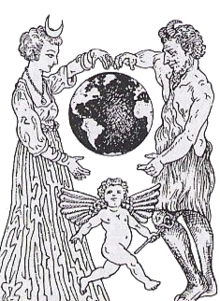
| Part of a series on |
| Wicca |
|---|
 |
Wiccan views of divinity are generally theistic, and revolve around a Goddess and a Horned God, thereby being generally dualistic. In traditional Wicca, as expressed in the writings of Gerald Gardner and Doreen Valiente, the emphasis is on the theme of divine gender polarity, and the God and Goddess are regarded as equal and opposite divine cosmic forces. In some newer forms of Wicca, such as feminist or Dianic Wicca, the Goddess is given primacy or even exclusivity. In some forms of traditional witchcraft that share a similar duotheistic theology, the Horned God is given precedence over the Goddess.[1]
Some Wiccans are polytheists, believing in many different deities taken from various Pagan pantheons, while others would believe that, in the words of Dion Fortune, "all the Goddesses are one Goddess, and all the Gods one God". Some Wiccans are both duotheistic and polytheistic, (and sometimes a combination of duotheism, polytheism, and pantheism), in that they honor diverse pagan deities while reserving their worship for the Wiccan Goddess and Horned God, whom they regard as the supreme deities. (This approach is not dissimilar to ancient pagan pantheons where one divine couple, a god and goddess, were seen as the supreme deities of an entire pantheon.) Some see divinity as having a real, external existence; others see the Goddesses and Gods as archetypes or thoughtforms within the collective consciousness.
According to several 20th century witches, most notably Gerald Gardner, the "father of Wicca", the witches' God and Goddess are the ancient gods of the British Isles: a Horned God of hunting, death and magic who rules over an after-world paradise (often referred to as the Summerland), and a goddess, the Great Mother (who is simultaneously the Eternal Virgin and the Primordial Enchantress), who gives regeneration and rebirth to souls of the dead and love to the living.[2] The Goddess is especially connected to the Moon and stars and the sea, while the Horned God is connected to the Sun and the forests. Gardner explains that these are the tribal gods of the witches, just as the Egyptians had their tribal gods Isis and Osiris and the Jews had Elohim; he also states that a being higher than any of these tribal gods is recognised by the witches as Prime Mover, but remains unknowable, and is of little concern to them.[3]
The Goddess is often seen as having a triple aspect; that of the maiden, mother and crone. The God is traditionally seen as being the Horned God of the woods. A key belief in Wicca is that the gods are able to manifest in personal form, either through dreams, as physical manifestations, or through the bodies of Priestesses and Priests. Both deities are connected to all religion.
Gardnerian Wicca as a denomination is primarily concerned with the priestess or priest's relationship to the Goddess and God. The Lady and Lord (as they are often called) are seen as primal cosmic beings, the source of limitless power, yet they are also familiar figures who comfort and nurture their children, and often challenge or even reprimand them.
- ^ "Traditional Witchcraft Compared to Wicca".
- ^ Gardner, Gerald (1988) [1959]. The Meaning of Witchcraft. Lakemont, GA US: Copple House Books. pp. 260–261.
- ^ Gardner, Gerald (1988) [1959]. The Meaning of Witchcraft. Lakemont, GA US: Copple House Books. pp. 26–27.